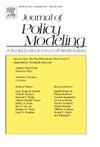治理、金融开放和非洲可再生能源投资
IF 3.1
2区 经济学
Q1 ECONOMICS
引用次数: 0
摘要
可持续发展目标7强调各国需要扩大可再生能源投资,因为可再生能源解决了全球气候变化和能源不安全问题。然而,信贷可及性仍然是实现这一目标的主要障碍。金融开放解决了这一障碍;然而,关于金融开放对可再生能源投资影响的实证证据仍然有限。因此,本研究对2004 - 2020年18个非洲国家金融开放与可再生能源投资的关系进行了研究,重点关注制度质量的作用。采用具有Driscoll-Kraay标准误差的固定效应模型,研究发现,金融开放是非洲可再生能源投资的重要推动因素;然而,非洲薄弱的制度环境削弱了金融开放对可再生能源投资的积极影响。该研究估计,为了有效促进可再生能源投资,非洲必须在金融开放的- 2.5-2.5 范围内达到制度质量的最低门槛(2.1)。该研究建议决策者加强非洲金融开放的总体制度框架,以有效推动可再生能源投资。本文章由计算机程序翻译,如有差异,请以英文原文为准。
Governance, financial openness, and renewable energy investment in Africa
Sustainable Development Goal 7 stresses the need for countries to expand renewable energy investment since renewable energy addresses global climate change and energy insecurity. However, credit accessibility remains a major obstacle to realising this goal. Financial openness addresses this obstacle; however, empirical evidence on the impact of financial openness on renewable energy investment remains limited. Therefore, this study probes the association between financial openness and renewable energy investment in 18 African countries from 2004 to 2020, focusing on the role of institutional quality. Using the fixed-effects model with Driscoll-Kraay standard errors, the study finds that financial openness is a significant enabler of renewable energy investment in Africa; however, Africa’s weak institutional environment mitigates the positive impact of financial openness on renewable energy investment. The study estimates that Africa must reach a minimum threshold of institutional quality (2.1) on the −2.5–2.5 scale for financial openness to effectively boost renewable energy investment. The study recommends that policymakers enhance the overall institutional framework in Africa for financial openness to effectively drive renewable energy investment.
求助全文
通过发布文献求助,成功后即可免费获取论文全文。
去求助
来源期刊

Journal of Policy Modeling
ECONOMICS-
CiteScore
6.20
自引率
11.40%
发文量
76
期刊介绍:
The Journal of Policy Modeling is published by Elsevier for the Society for Policy Modeling to provide a forum for analysis and debate concerning international policy issues. The journal addresses questions of critical import to the world community as a whole, and it focuses upon the economic, social, and political interdependencies between national and regional systems. This implies concern with international policies for the promotion of a better life for all human beings and, therefore, concentrates on improved methodological underpinnings for dealing with these problems.
 求助内容:
求助内容: 应助结果提醒方式:
应助结果提醒方式:


